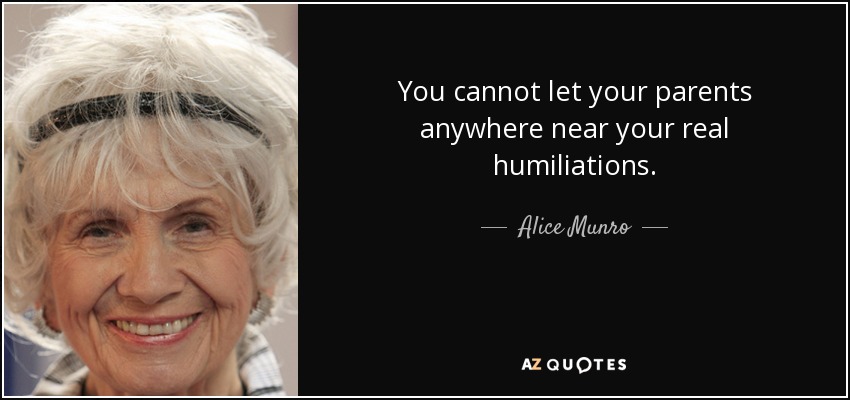

The tiny share we have of time appalls me, though my father seems to regard it with tranquility. I try to see that plain before me, dinosaurs walking on it, but I am not able to even imagine the shore of the Lake when the Indians were there, before Tuppertown. They were new, as time went. Alice Munro.And then the ice went back, shrank back towards the North Pole where it came from, and left its fingers of ice in the deep places it had gourged, and ice turned to lakes and there they were today. Quotes tagged as figurative-language Showing 1-30 of 48. Munros work has been described as having revolutionized the architecture of short stories, especially in its tendency to move forward and backward in time.Identify the speaker of the quote But, soft what light through yonder.


For the briefest moment, the present is overshadowed by the past.Despite the relative simplicity of the reunion, the narrator, as young as she is, still recognizes something different that opens up the mystery of who her father is — or, rather, was:One of the things my mother has told me in our talks together is that my father never drinks whisky. It’s a brief moment of happiness snatched from otherwise hard times — hard times for Nora here with her aging mother and hard times for Ben at home with his failures and his wife. Nora gets Ben a bit of whisky which he drinks, and Nora turns on some music so she and the young children can dance a bit. They are all pleased to see each other after such a long time, and Nora seems genuinely glad to see Ben with his lovely children, though at one time she might have hoped Ben’s children would be her own (we never learn the exact nature of their friendship).Nothing happens that could be called particularly dramatic. Our narrator has no idea who this woman is.It’s a friendly visit, and the narrator watches as her father interacts with Nora and Nora’s blind mother, who seems to drift in and out. After some discouragement he covers with a light heart, he takes them beyond his sales boundary to the home of someone he once knew quite well, Nora Cronin, but he hasn’t seen Nora for years, not since well before our narrator was born.
It describes her depression dad, of course, gamely using good humor, good will and energy to eke out a living as a door-to-door salesman. A great introduction to Munro.As for me, first, the title, “Walker Brothers Cowboy”. The past of the Lakes is tremendous and incomprehensible, but she finds, to her surprise, that so is the relatively limited past of her father.And thus we embark with Alice Munro into these things we will never know.Beautiful post, Trevor, about a beautifully told story. Then there is our young narrator, just beginning to get a sense of the past. Grandma Cronin, on the other hand, is blind to the present indeed, she seems to drift in from the past and then back to the past again.
On the evening ride home, Munro describes the girl as thinking over the visit with Nora in this way: “She digs with the wrong foot, I think and the words seem sad to me as never before, dark, perverse.”So much in that. And she notes that Nora is laughing – not felled by a head-ache.One of the girl’s solitary ways is to think, think about what she sees, and in particular, to think about words and the way they define what she has seen. And she dances with Nora, and says of herself dancing, “me proud, intent”. Instead, what the sturdy girl enjoys is being like the other kids, who “ themselves in such solitary ways as I do all day.”When she meets her father’s friend Nora, she wants to stay. But there is more: the girl, like a boy (unapologetic), is “wary of being trapped into sympathy or any unwanted emotion.” The girl is a stranger to the idea she must dress up or wear curls and bows.
They remind me of Isabel, James’s heroine from Portrait of a Lady. (I’m reading Michael Gorra on Henry James right now, and “Walker Brothers Cowboy” is Henry James country – these girls of Munro who want to think and choose and not have definition thrust upon them. And more important, the girl is troubled by the fact that Nora — this dancing woman in a bright flowered dress — could never have been her mother because she “digs with the wrong foot.” The girl now thinks of the saying in a new light after Nora, it is now – “dark, perverse.”There is in this narrator a stubbornness of self – an unwillingness to have received opinion thrust upon her, or to have unwanted emotion thrust upon her.What she wants is to be able to think. For another, there is the thinking of about the division implied by the saying and the being aware she might never see Nora again, or that it would be a long time before she saw the likes of her again – the brightness of her, the dancing, the welcome, the absence of head-ache that Nora represents.The girl rejects the received truth of this saying as it applies to Nora – that Nora cannot be a part of their life because she is Catholic and should be separate. For one thing, in the word foot there is the echo of the dancing, which the girl loved.
(What this sentence says about the characterizations is a whole other riff, and not my object this time.)The way the girl loves to observe and think, and the way, if she wants to, she “ even turn head” – this is Munro’s voice, fully formed in this early writing.The story takes place in the 30’s – but it serves the 60’s, when it was written – the time when women thought they just might have before them an escape from a life of sick-headache. (The way, really, that James is always having his characters and his readers “see” – the way, after enough time, a night’s thinking, maybe – realization emerges.)One other thing about this girl narrator interests me: here and there in the story the adult who is doing the telling slips in an observation that is primarily the adult self thinking it all over – as in when she says, “The tiny share of time we have appalls me, though my father seems to regard it with tranquility.” This is beyond what an eight year old might think in these exact words – but she might intuit it as a child, and put words to it as an adult.How Munro gets away with this doubleness of consciousness is one of the things that makes this story so effective. She is so cautious: she wants us to see. And there is a gorgeous Isabel in “Leaving Maverly”.) What Munro makes her narrators do is think about what they have observed.But I think it’s also that Munro does not want to thrust unwanted emotion on us, her readers.


 0 kommentar(er)
0 kommentar(er)
